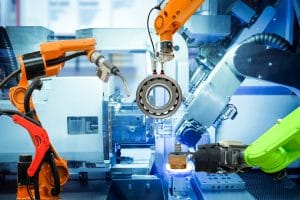 While automated technology has largely taken over a significant portion of many industries, its wide spread adoption was the culmination of several different technological developments. One of those is the ability to streamline electrical thermal management to provide constant, reliable cooling for technology that’s meant to run on its own. Besides creating technology that’s smart and powerful enough to make automation possible, such technology also requires equally smart and powerful solutions for dealing with electrical overheating. Because of their unique methods of transferring heat, heat exchangers have often been the most-relied upon thermal management solution for increasingly more advanced automated technology. (more…)
While automated technology has largely taken over a significant portion of many industries, its wide spread adoption was the culmination of several different technological developments. One of those is the ability to streamline electrical thermal management to provide constant, reliable cooling for technology that’s meant to run on its own. Besides creating technology that’s smart and powerful enough to make automation possible, such technology also requires equally smart and powerful solutions for dealing with electrical overheating. Because of their unique methods of transferring heat, heat exchangers have often been the most-relied upon thermal management solution for increasingly more advanced automated technology. (more…)
Thermal Management in the Food & Beverage Industry
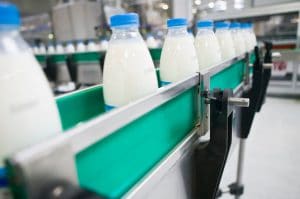 Agriculture and food and beverage manufacturing have benefited greatly from advancing technology over the years. That includes the innovation of streamlined thermal management solutions, like heat exchangers, that can be employed for a wide variety of applications. Everything from electrical thermal management to the precise heating and cooling of various substances have all become much more efficient and reliable processes. Much like in every other industry, food and beverage companies have transformed the way they approach heating and cooling solutions thanks to the help of modern heat exchangers. (more…)
Agriculture and food and beverage manufacturing have benefited greatly from advancing technology over the years. That includes the innovation of streamlined thermal management solutions, like heat exchangers, that can be employed for a wide variety of applications. Everything from electrical thermal management to the precise heating and cooling of various substances have all become much more efficient and reliable processes. Much like in every other industry, food and beverage companies have transformed the way they approach heating and cooling solutions thanks to the help of modern heat exchangers. (more…)
3 Reasons for 3D Prototyping in Heat Exchanger Manufacturing
 The goal of any heat exchanger manufacturing company is to provide the highest quality thermal management solutions to all of its clients. In doing so, the implementation of rapid 3D prototyping has been a giant leap toward reducing hindrances such as inaccurate designs, prolonged manufacturing times, and excessive unforeseen costs. By rapidly printing prototypes of every heat exchanger unit and component before producing their final versions, makers of modern heat exchangers can ensure a higher level of quality for all of their products than ever before. (more…)
The goal of any heat exchanger manufacturing company is to provide the highest quality thermal management solutions to all of its clients. In doing so, the implementation of rapid 3D prototyping has been a giant leap toward reducing hindrances such as inaccurate designs, prolonged manufacturing times, and excessive unforeseen costs. By rapidly printing prototypes of every heat exchanger unit and component before producing their final versions, makers of modern heat exchangers can ensure a higher level of quality for all of their products than ever before. (more…)
Cooling More with Less Energy Boosts Productivity
 There are many ways to approach boosting productivity, and in most industries, thermal management is one of the most common ones. In the immediate term, for instance, implementing more eco-friendly thermal management solutions like heat exchangers can save companies on the costs of both energy and manpower. This means they not only improve the efficiency of electrical thermal management, but also the level of productivity in several other operations in multiple areas throughout the company. (more…)
There are many ways to approach boosting productivity, and in most industries, thermal management is one of the most common ones. In the immediate term, for instance, implementing more eco-friendly thermal management solutions like heat exchangers can save companies on the costs of both energy and manpower. This means they not only improve the efficiency of electrical thermal management, but also the level of productivity in several other operations in multiple areas throughout the company. (more…)
Heat Exchangers Optimize Modern Technology Designs
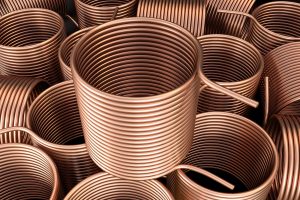 Some concepts carry on from one technology to the next as they advance. For instance, the fact that electricity generates heat, and that most technology can easily be damaged by that waste heat. That fact is one of the reasons why heat exchangers have also carried on from earlier technologies to today’s innovative solutions, all while maintaining their ability to optimize electrical thermal management in a wide range of applications. Their influence has become so prominent that many systems now include heat exchanger technologies in their original design specs. (more…)
Some concepts carry on from one technology to the next as they advance. For instance, the fact that electricity generates heat, and that most technology can easily be damaged by that waste heat. That fact is one of the reasons why heat exchangers have also carried on from earlier technologies to today’s innovative solutions, all while maintaining their ability to optimize electrical thermal management in a wide range of applications. Their influence has become so prominent that many systems now include heat exchanger technologies in their original design specs. (more…)
What Kinds of Costs Do Heat Exchangers Save?
 These days, it’s no secret that electrical thermal management is a great area for companies to streamline operations and reduce overall costs. Once companies began replacing older, more conventional air conditioners with heat exchangers, these benefits became apparent. However, many companies are pleasantly surprised to learn that heat exchangers can provide significantly more benefits than they originally realized. Depending on their specific application, the more advanced thermal management units help companies save on costs in several different ways. (more…)
These days, it’s no secret that electrical thermal management is a great area for companies to streamline operations and reduce overall costs. Once companies began replacing older, more conventional air conditioners with heat exchangers, these benefits became apparent. However, many companies are pleasantly surprised to learn that heat exchangers can provide significantly more benefits than they originally realized. Depending on their specific application, the more advanced thermal management units help companies save on costs in several different ways. (more…)
Are There Different Types of Heat Exchangers?
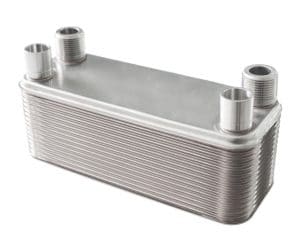 Since heat exchangers were introduced into manufacturing and other industries, companies finally have options for their various thermal management needs. Today, they have significantly more options thanks to the increasing variety of heat exchanger technologies. From ambient and below-ambient units to using varying combinations of natural/forced convection, conduction, and phase-change cooling, modern heat exchangers are designed to address virtually every consideration when it comes to advanced thermal management. That means more companies in more industries can benefit by implementing the right kind of heat exchanger for a variety of thermal management needs. (more…)
Since heat exchangers were introduced into manufacturing and other industries, companies finally have options for their various thermal management needs. Today, they have significantly more options thanks to the increasing variety of heat exchanger technologies. From ambient and below-ambient units to using varying combinations of natural/forced convection, conduction, and phase-change cooling, modern heat exchangers are designed to address virtually every consideration when it comes to advanced thermal management. That means more companies in more industries can benefit by implementing the right kind of heat exchanger for a variety of thermal management needs. (more…)
Clearing Up Thermal Management Questions
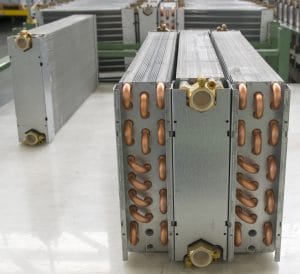 A lot has changed about electrical thermal management over the last few decades. Most importantly, the way in which companies approach it on an industrial level. With the advent of heat exchangers, companies that rely on technology and large equipment found a new, more affordable, and more efficient way than air conditioning to keep that equipment from overheating. They also began to realize that electrical thermal management is a much more versatile concept than they believed, which has led to increasingly more advancements in modern manufacturing technologies and techniques. (more…)
A lot has changed about electrical thermal management over the last few decades. Most importantly, the way in which companies approach it on an industrial level. With the advent of heat exchangers, companies that rely on technology and large equipment found a new, more affordable, and more efficient way than air conditioning to keep that equipment from overheating. They also began to realize that electrical thermal management is a much more versatile concept than they believed, which has led to increasingly more advancements in modern manufacturing technologies and techniques. (more…)
A Look at How Manufacturing Is Going Green
 While improved productivity and lower overhead costs are significant factors in adopting new technology, eco-friendliness has become as important a consideration these days. On one hand, many regulations now mandate that companies take measures to reduce their environmental footprints. Otherwise, they may face massive fees in penalties. On another hand, today’s consumers also demand that the companies they do business with are more environmentally friendly than companies have been in the past. Together, these concerns have driven companies to race toward going green in both the products they provide and the manufacturing processes they employ. (more…)
While improved productivity and lower overhead costs are significant factors in adopting new technology, eco-friendliness has become as important a consideration these days. On one hand, many regulations now mandate that companies take measures to reduce their environmental footprints. Otherwise, they may face massive fees in penalties. On another hand, today’s consumers also demand that the companies they do business with are more environmentally friendly than companies have been in the past. Together, these concerns have driven companies to race toward going green in both the products they provide and the manufacturing processes they employ. (more…)
From Farm to Table – Heat Exchangers in Modern Agriculture
 As one of the more vital industries, agriculture has long been one of the first to benefit from advanced manufacturing and other technologies, including advanced thermal management. In everything from farming equipment and dairy production to packaging and shipping operations, heat exchangers have helped virtually every part of the industry catch up to 21st century standards of safety, efficiency, and productivity. While this has greatly benefited the industry, it has also been of significant benefit to the communities that it supports across the country. (more…)
As one of the more vital industries, agriculture has long been one of the first to benefit from advanced manufacturing and other technologies, including advanced thermal management. In everything from farming equipment and dairy production to packaging and shipping operations, heat exchangers have helped virtually every part of the industry catch up to 21st century standards of safety, efficiency, and productivity. While this has greatly benefited the industry, it has also been of significant benefit to the communities that it supports across the country. (more…)







